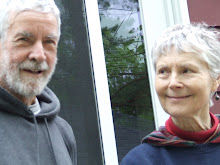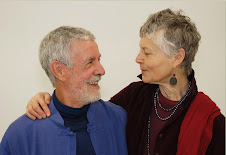Dear Family and Friends,
I got a Happy Easter phone call from my brother-in-law a
few days ago, so it’s fitting that I do the same, and for additional
reasons. You see, I am currently writing about what Francis said (on this
exact day) – three months and three years ago. It was December 29,
2009.
The poem I’m attaching feels like the most important poem
yet. But this, one of the 48 additional poems that have come since the
publication of Sing to Me and I Will Hear You – The Poems will be
published after this prose book is completed - Sing to Me and I Will Hear
You – The Love Story.
The poem came after I transcribed audiofiles of Francis’
and my last four (of five) extraordinary dialogues. I waited three years
to listen to those recordings, made possible because Francis’ wonderful doctor,
Dr. Devlin, had volunteered his recorder. This poem provides a short
overview of part of what I have been writing about (Francis’ last 100 days)
since last autumn. After that, I’ll go back to Chapter 4 which is only
partly written.
Yes, during this celebration of Jesus’ Passover, it’s
altogether fitting that I share with you who love him, what Francis said as he
made his own Passover – and what he said about Jesus. So here’s the poem
written earlier this month:
I
She did not dare -
could not bear
before
to hear his voice again.
To see,
even just his writing,
his cursive script
–
that took a lot,
already.
When holding to her
face
his worn grey
sweatshirt
she could breathe in
the sweet scent of
him,
uniquely
his.
And the taste of
him?
Oh that - she always
has,
in poems she
wrote.
In
prayer.
But his voice?
His rich and resonant voice?
She’d heard it
once,
within her
ears:
“I love you, dear” -
a
visitation
she had called it; a
miracle
become a daily mantra
that sustains her still.
But now to know his
real,
live
voice awaited her on audiofiles - she knew
it was time to hear his voice again
kept live through
time
these last three years.
She sat before the
monitor,
snapped on
speakers,
found the file
and paused.
It took three clicks
and there they were:
the files centered on their four
"last
suppers."
II
It was the week after Christmas.
Hildegard von Bingen's
Canticle of
Ecstasy
flooded their room.
A dinner tray sat on Francis’ lap.
She offered him a bite,
then took one of her own.
He smacked his lips
over Tuscan kale.
“Such feasts given us by friends,”
he said, then wept with her
at the generous
love
they spent on them,
sending cards and emails
for
a last
“Message for Francis”
read aloud at
dessert.
“The love’s so rich,” she
said,
it feels
decadent.”
He called their dinners –
“last suppers.”
The talk turned deep,
her listening,
intent.
“When Jesus joined
in
our human condition,” he
said,
sharing his thoughts of
recent days,
“in a way,
we too were raised -
to that
new
level.”
She relaxed, breathing in her
gratitude.
At another last supper
he thanked her for trimming
his hair and beard
that
day.
“Such a loving experience
we had together!”
he affirmed.
“You injected new energy
and life in me:
It’s not time yet.”
She massaged his legs and arms
as he fell
asleep.
On the day of New Year's Eve
he wouldn't
eat,
but then at night he changed his
mind.
“For my sake?” she asked.
“For us,” he answered.
They were both aware:
this night could be the
last
of all the last suppers they’d held
dear.
So they embraced the little
spark
of which he spoke.
“With patience,” he suggested,
in a weak and scratchy
voice,
“it might become something bigger.”
"He had," he
said,
"just a very small window
I'm allowed in the world,
tonight."
But he was not
bereft,
she was relieved
to hear him say, for he’d wrestled
with some terror –
fear of the unknown,
earlier that week
-
“not without comfort,” he repeated,
his voice frail.
Hovering on the edge of New Year’s day –
the year into which
he would hardly step
before he left –
the music stopping time
for them that night,
was not a canticle of
ecstasy
but a virtuoso oud player’s
mesmerizing
music.
They reminisced.
Seven years before on his 75th birthday,
that music had filled Bella
Cuchina,
the restaurant they’d rented
to celebrate with family and friends.
The occasion, the music, had swept
them
in a transport of joy.
Here now alone, together they relived it.
“That music tears your heart out, doesn’t
it?!”
she said. And he?
He began to softly sing,
his pitch, melody
in perfect rhythm
with the master’s own.
His voice grew strong and full,
its signature resonance, once more
rich.
After a pause, before beginning
again
into sing-a-long mode, he said –
“What a melody, huh?!”
III
Now she’d heard him
again,
heard him singing his joy with her,
on the verge of his dying,
on the brink of his death.
Francis’ faith in Jesus’ resurrection as something
mysteriously bestowed upon us all is a faith I cherish as most of you do.
I’m a member of a small community in our parish which is
open to others, for discussion and monthly “Agape” prayer. Earlier this
week two articles were sent around preparatory to that meeting.
Carol Zaleski wrote both of them. I was deeply moved by this
passage from the one entitled “Immortal Dreams”:
“There are hints in the Hebrew Bible: ‘If a man
die, shall he live again?’ asks the book of Job. ‘All the days of my service I
would wait, for my release to come. Then you would call, and I should answer
you; you would long for the work of your hand.’ (RSV) It is this call
from our Maker and Redeemer that awakens us from death, not some inherent
excellence and indestructibility in our souls.”
Here’s the link: http://www.christiancentury.org/article/2012-11/immortal-dreams
but I’ve copied the whole article below.
Even if this doesn’t fit in with the Passover theme, our
group did discuss this second article I also liked - about prayer. In
fact, this passage quoting Karl Barth moved me to tears: “But what about
foolish prayers, trivial prayers and selfish prayers? Karl Barth is comforting
here. “We do not know what proper prayer is,” he admits, and it is actually
a sign of our faith that we run to God in prayer with “haste and restlessness.”
To do so reveals a trust that we are in communion with God, who intercedes
for us with sighing too deep for words, who hears and answers prayers
“quite apart from our weakness or strength, our ability or inability to pray.”
In prayer, said Barth, we stand beside God as friends.”
It’s heartwarming that our new pope called himself Pope
Francis. But even more moving to me is his actions, like yesterday’s,
which our local paper reported this morning. The headline reads: Pope
Washes Women’s Feet in Break With Church Law: http://news.yahoo.com/pope-washes-womens-feet-break-church-law-002454620.html
I like the last few lines of this article which is more
complete online: “Francis responded that it was to ‘help me to be
humble, as a bishop should be.’ The gesture, he said, came ‘from my heart.
Things from the heart don't have an explanation.’”
What is especially telling is his referring to himself
often as “the bishop of Rome.” In the early church the Pope was seen as
the first of all the bishops, exercising “the Petrine ministry,” but he was
still mainly “the bishop of Rome.” It all fits the humility of St.
Francis of Assisi, Francis’ patron saint.
Just one more thing about Pope Francis. Some of you
may be aware that some people are questioning his role during “The Dirty Wars”
in Argentina, specifically, some say he didn’t do enough. (Others, on the
other hand demonstrate he did what he could, even at his own risk.) In
any case, I was especially moved by the concluding paragraph of this article –
“ Pope Francis: A Modern Passion Play” By Steve Weissman, Reader
Supported News 28 March 13
“Readers will decide for themselves what to make of this,
but let me share my personal reaction. As an atheist and Jew - and yes,
one can be both - I find scriptural arguments for and against liberation
theology completely foreign. But I have long valued the political work its
adherents do in poor communities. I must also confess a surprising sympathy
for the new pope. I can only assume he believes in a just God who knows what he
did during the Dirty War. This is the cross Pope Francis bears, and it must be
terrifying, an unending crucifixion in his personal passion play. If I could
only write that play as a work of fiction.”
(Info about this writer): A veteran of the
Berkeley Free Speech Movement and the New Left monthly Ramparts, Steve Weissman
lived for many years in London, working as a magazine writer and television
producer. He now lives and works in France, where he writes on international
affairs.
Joyous Easter everyone!
Love,
Elaine

















